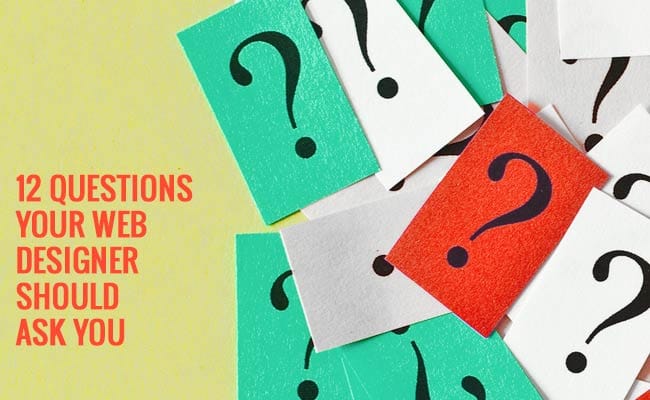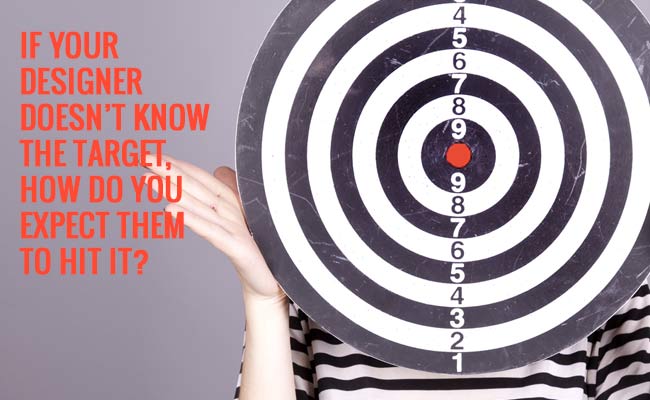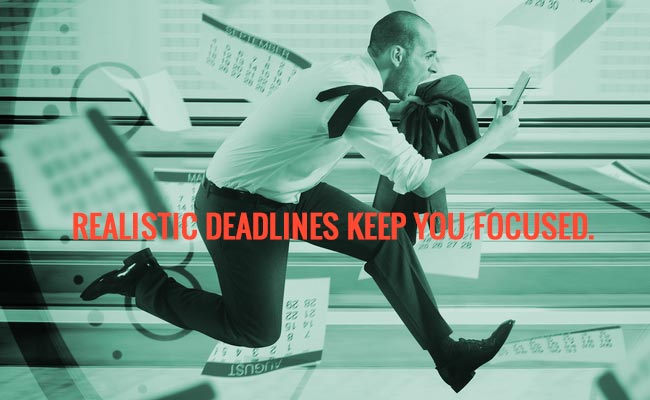A good web designer knows there’s much more to building a new website than visuals.
But they can’t go it alone. You, the client, play a crucial role in the process. In order to gain the insights needed to create a powerful, engaging website, these are 12 questions your web designer should always ask you before they create a single pixel.
-
What are your business goals?
Most designers don’t ask this. They begin with colors and fonts. We don’t. We need to know what success looks like for you. It isn’t always “I want to make more money.” It can be getting more visibility, rewriting the site with more compelling copy, increasing product offerings, starting article writing or increasing an email list.
Learn more about our process here
If your designer doesn’t know the target, how do you expect them to hit it?
-
“What exactly do you do?”
We are always amazed at the lack of clarity we see on the home pages of websites. How often do you say “huh?” when reading the headline? Getting it clear gives the designer and writer the ability to focus on what is most important and communicate effectively with visitors.
-
“What makes you special?”
This is one of the harder questions. Think of it like this: businesses are like snowflakes. They all look alike at first, but when you zoom in, every one is different.
Every business has something unique to offer. Talking this out with your designer uncovers your snowflake design. It can be the way you handle customer service (think Zappo), social responsibility (think Warby Parker), offering a complimentary consultation or your unique process.
Your designer can weave your special qualities into the copy, infographics or headlines to give people a reason to work or buy from you.
-
“Who is your target customer?”
Knowing exactly who your target audience is affects every aspect of your design. After all, a site that would appeal to teenage boys would be very different from one selling to women over 60.
Visuals aside, these breakdowns also affect:
- The tone of voice of the copy
- Search engine optimization (SEO) efforts
- User experience
- Social media integration
Your designer will ask a lot of questions or give you a sheet to fill out to dig into the details. It may be more than one persona.
Explore how to create buyer profiles
-
“Who are your main competitors?”
You know who takes business from you, your designer doesn’t. Sharing that information with your designer allows them to see what others are doing (or not doing) with their websites. They can assess what is working well and not so well for the other guy.
The intent here is not to copy what others are doing, but to position you in a different way.
-
“Who is providing the website’s content?”
The language you use directly affects the perception of your business.
In our experience, most business owners are lousy writers. You have to get this right. Invest in a copywriter. It is the single most important element of your website. A good design firm should have the resources for this.
The written content is the thing that puts a website project in stall mode most often.
You need to provide the technical information and be available to review it, but stick to running your business. It will take a lot of pressure off of you, the project will be completed faster, and you will end up with a much better product in the end.
Another plus to getting professional writing for the web is that once you have that nailed down, it can be repurposed in other ways like brochures, eBooks and presentations, saving resources later on.
Learn more about our writing services
-
“What websites do you like (or hate) and why?”
This is where your designer can get a sense of your visual preferences and functionality. This is a subjective question but it helps a designer to know what visual style you respond to. They may disagree with you if you want your legal site to be hot pink because it’s your daughter’s favorite color but it serves as a talking point.
Your web designer should always ask you this question, then there’s less risk of getting a site that’s (possibly) amazing but just isn’t your cup of tea.
-
“What specific functionalities will be included on your site?”
Designers are expected to give you a cost up front. When you provide details of how you want your website to work, they can include it in the estimate.
Do your homework. Visit other sites and make note of pages that have something you like: a popup signup, a live chat feature, animations, registration forms or a way products are set up.
This is a pitfall we have fallen into often with our clients. No one wants to have the cost creep up halfway through the project.
With commerce sites or sites with greater complexity, we invest in a set of “technical specs” beforehand to avoid unpleasant surprises.
-
“What is your deadline for completing the site?”
You have a deadline in mind, right? Well you should! Having a realistic deadline not only keeps your designer on track, but it will keep you focused as well. All too often, website projects start with a bang and fizzle out over a span of months because a timeline was never established. It’s a good sign if your designer asks because it means they respect your time and care about getting the website finished when you need it. Respect theirs too!
-
“What resources are you allocating for new content creation every week?”
A new website is only the beginning. A key element in your SEO strategy is keeping your content fresh. When I ask a client this question, I am looking to find out how I should design their site to plan for the future.
This can be done a number of ways, including:
- Writing a blog
- Creating ebooks and presentations
- Adding user-generated content if appropriate
- Creating a podcast or videos
- Adding a discussion board
The ideas are endless, but it all comes down to how much time and money you are willing to invest in the success of your website.
-
“How do you think people search for your product?”
SEO is your key to being found on the web. Your designer should be asking you this because keywords have a big impact on both the copy and the overall site structure as well. Your designer or SEO team will use your words as a starting point, but you need to provide common terminology used in your industry to kick it off.
-
“Who is doing the SEO work on your website?”
Optimizing your website is not a throw-in on your project. It takes experience and time to do the SEO work on your pages. A good web design agency (like us!) has the skills to do the initial compliance, and has an SEO firm they work with for more complex and aggressive projects.
Do not overlook this as a line item in the cost of your new website.
Final Thoughts
There is much more to your new website than just the visual elements. A good web designer knows this and will go beyond the basics.
The questions on this list provide crucial insight into your business. Your web designer should ask them in order to make fully informed design decisions that will positively impact your business for years to come. It isn’t all up to them. It’s up to you to support the project.









